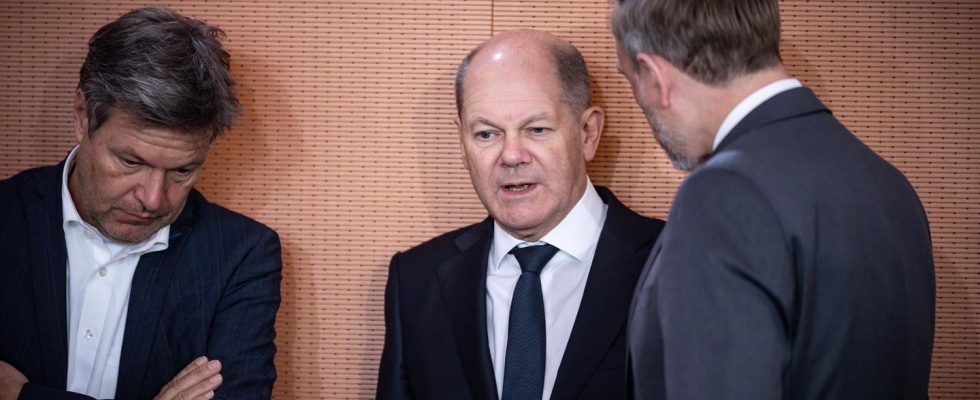ARD “Germany trend”
AfD on a par with SPD: CDU sees “chaos politics” of the traffic light coalition as the reason
The traffic light in the stress test – according to the ARD “Deutschlandtrend” their satisfaction values are lower than ever
© Michael Kappeler / DPA
In a new survey, the AfD draws level with the chancellor party SPD. The CDU general secretary sees the reason for the recent AfD gains in the “chaos policy” of the red-green-yellow government – but also strikes a self-critical tone.
CDU General Secretary Mario Czaja attributed the AfD’s poll high to uncertainty caused by the traffic light coalition’s policy. “But of course we also have to ask ourselves self-critically why these disappointed people are turning to the extreme fringes,” said the opposition politician to the newspapers of the Funke media group.
The AfD continued its survey upswing and drew level with the SPD in the new ARD “Germany trend”. In the Infratest dimap survey published on Thursday evening, both parties came to 18 percent and share second place in the voters’ favour. At the same time, satisfaction with the traffic light government fell to a low.
“We are observing the increase in support for the AfD in the current opinion polls with great concern,” said Czaja. There has always been a right-wing extremist potential throughout the country. “We can’t reach this hard core and that’s not our goal either. But among those who favor the AfD at the moment, there are also many people who are simply disappointed, who are increasingly losing trust in democracy and its institutions .” This is “mainly due to the great uncertainty that the traffic light causes with its leadership-less chaos policy, be it with the heating, with the health care or with the topic of immigration”.
The AfD is steadily winning, also in other surveys
The polls of the AfD have been on the upswing for a long time, and at several other institutes they were recently behind the SPD and ahead of the Greens by a small margin. AfD leader Tino Chrupalla saw this as confirmation of his party’s course and particularly emphasized a clear demarcation from the Greens. “Citizens can see where the value-based policy of the Greens is leading. Namely to economic war, inflation and deindustrialization,” he told the Funke newspapers. At the same time, Chrupalla emphasized that the AfD was “not just a protest party” – he rather saw a trend that “more and more citizens are voting for us out of conviction”.
However, in the “Germany trend” 67 percent of AfD supporters stated that they wanted to vote for the party out of disappointment with the other parties. Only 32 percent justified their tendency with conviction.
The AfD gained two percentage points in the survey compared to the beginning of May, the SPD lost one percentage point. Clearly the strongest force is still the Union with 29 percent (-1). The Greens lose a point and come to 15 percent, the weakest value since September 2021.
According to ARD information, this is the best value for the AfD in the Sunday question in the “Deutschlandtrend”. Only in September 2018 had the party reached this value. Two-thirds of AfD supporters named immigration as the three most important issues.
In March 2021, the Federal Office for the Protection of the Constitution classified the AfD as a suspected right-wing extremist – an assessment that was confirmed around a year later by the Cologne Administrative Court in the first instance. The party is defending itself legally. The proceedings at the Higher Administrative Court in Münster are still ongoing.
Satisfaction with the federal government at an all-time low
According to the Infratest survey, satisfaction with the federal government fell again significantly last month. Only one in five (20 percent) is currently satisfied with the work of the coalition. That is by far the weakest value since the coalition work began in December 2021. In the past few weeks, the violent coalition dispute over the heating law had made the headlines.
Referring to his own party, CDU General Secretary Czaja said: “As a Union, we must be better able to convey our alternatives to current politics, our concepts and our ideas.” You have to go where it hurts. “We have to communicate hard and clearly on the matter, but always remain authoritative and factual in our tone.” On the Welt-TV broadcaster, the Thuringian CDU state chairman, Mario Voigt, called on his party to “have the courage to speak up more clearly” on the issues of migration and energy in particular.

